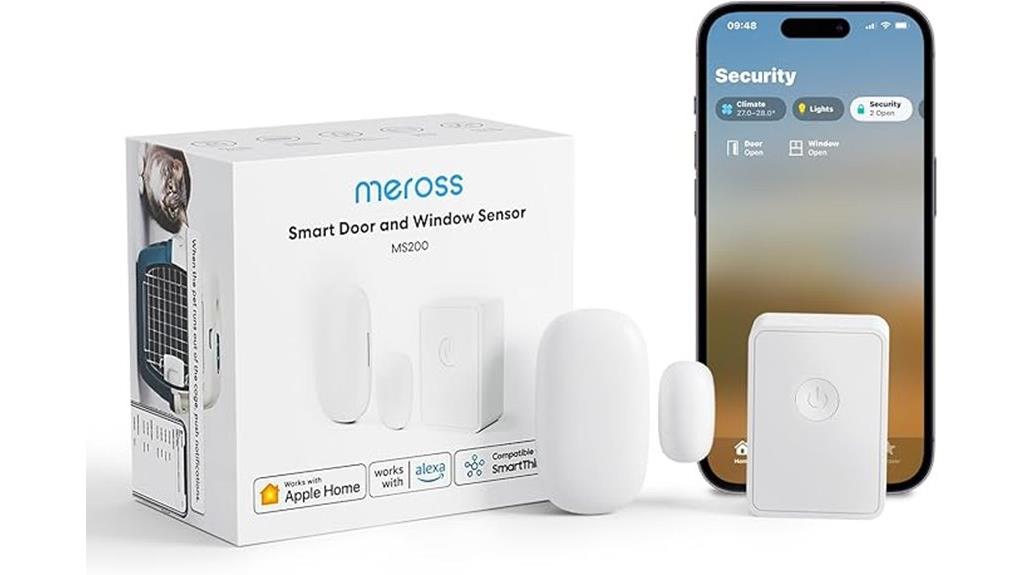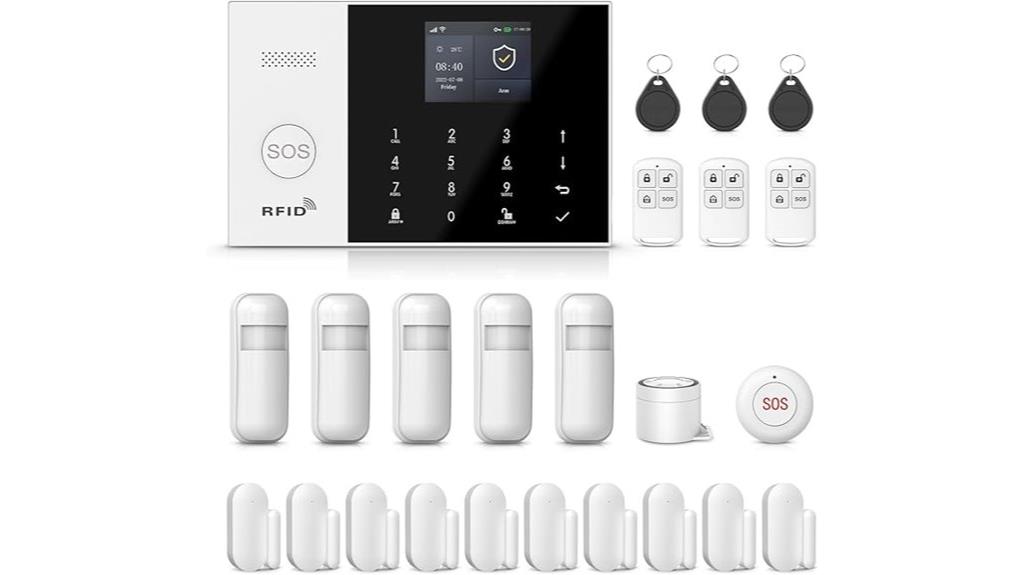For the best HomeKit Secure Router systems, I recommend looking into models that support WPA3 encryption, automatic firmware updates, and strict access controls to keep your network secure. Devices with Mesh Wi-Fi capabilities ensure seamless coverage, while user-friendly setups make installation easy. Prioritize routers that offer device management features and guarantee compatibility with HomeKit Secure Video. Keep these factors in mind, and you’ll find the perfect solution for ultimate smart home privacy—and there’s more to explore if you continue.
Key Takeaways
- Look for routers supporting WPA3, HomeKit Secure Router integration, and automatic firmware updates for enhanced security.
- Prioritize models with robust privacy features, no data collection, and strict access controls to protect user data.
- Choose systems offering high-speed Wi-Fi 6/6E and mesh capabilities for seamless coverage and device management.
- Opt for routers with user-friendly setup, remote management, and real-time device monitoring for comprehensive control.
- Ensure compatibility with Apple’s ecosystem and verify security protocols to guarantee a secure, private smart home environment.
MAX Router Rebooter, Wi-Fi Reset Device

The MAX Router Rebooter is an ideal choice for anyone who wants to keep their internet connection stable without the hassle of manual resets. It automates router resets and continuously monitors your router and modem health, ensuring reliable uptime. You can schedule periodic resets to keep your connections fast and fresh, which is perfect for smart home devices. Plus, it offers real-time alerts via texts or emails when issues are detected, keeping you informed. With cloud management and remote access through a user-friendly app, you can oversee multiple locations effortlessly. No app needed for basic use, making it simple and effective for maintaining a seamless internet experience.
Best For: individuals or households seeking a hassle-free, automated solution to maintain a stable internet connection across multiple locations without manual resets.
Pros:
- Automates router and modem resets to ensure continuous internet uptime
- Offers real-time alerts via texts or emails for proactive issue management
- Supports remote management and monitoring through a user-friendly cloud app, ideal for multiple sites
Cons:
- Basic operation does not require an app, but advanced features need the premium cloud service
- May require initial setup for notifications and scheduling preferences
- Limited to network devices; does not provide broader network security features
Meross Smart WiFi Door & Window Sensor Kit

If you’re looking to enhance your home security with seamless automation, the Meross Smart WiFi Door & Window Sensor Kit stands out as a versatile choice. It supports Apple HomeKit, Alexa, Google Assistant, and SmartThings, making it easy to integrate into your existing setup. The kit includes a Meross Hub and operates on 2.4GHz WiFi, providing a reliable range of up to 328 feet. It’s perfect for doors, windows, or even cabinets. With real-time alerts via the Meross app, you’ll stay informed of any changes. Its small, sleek design and tool-free installation make it user-friendly, while automation options add convenience and security.
Best For: homeowners seeking a reliable, easy-to-install smart door and window sensor that integrates seamlessly with multiple smart home platforms for enhanced security and automation.
Pros:
- Supports multiple smart home ecosystems including Apple HomeKit, Alexa, Google Assistant, and SmartThings for versatile integration.
- Real-time notifications and history records up to 2 years enhance security monitoring.
- Compact, sleek design with tool-free installation makes setup quick and unobtrusive.
Cons:
- Operates solely on 2.4GHz WiFi, which may be susceptible to interference in crowded networks.
- Limited to 16 sensors per hub, which might be insufficient for large properties.
- Requires a stable WiFi connection and compatible mobile device for full functionality.
Wireless Home Security System with Door/Window Sensors and App Alerts

A wireless home security system with door and window sensors paired with app alerts offers an affordable, easy-to-install solution for those seeking basic protection without monthly fees. This DIY 4G/WiFi alarm kit includes 24 sensors, motion detectors, and accessories, all battery-powered and controlled via a smartphone app. It provides real-time alerts through the Tuya app and calls or messages via 4G GSM, with multiple alarm modes like sirens and adjustable arm/disarm settings. Compatible with Alexa and Google Assistant, it’s suitable for quick setup and everyday use. While not heavy-duty, it’s perfect for budget-conscious users wanting a simple, reliable way to monitor their home.
Best For: budget-conscious homeowners seeking an easy-to-install, basic security system with app alerts and no monthly fees.
Pros:
- Simple DIY installation suitable for all users, including elderly and children
- No subscription fees, with real-time alerts via Tuya app and 4G calls/messages
- Compatible with Alexa and Google Assistant for voice control
Cons:
- App interface may be unintuitive and manual instructions sometimes inaccurate
- Sensor battery life and adhesive durability can vary over time
- Customer service support has been reported as lacking
Factors to Consider When Choosing Homekit Secure Router Systems

When choosing a HomeKit Secure Router, I consider key factors like security protocols and device compatibility to keep my network safe. I also look at network speed, coverage, and management features to guarantee reliable performance and control. Finally, privacy, ease of installation, and setup are vital for a seamless and secure experience.
Security Protocols Compatibility
Choosing a HomeKit Secure Router system requires careful attention to security protocols to guarantee your network remains protected. I look for routers that support the latest standards, like WPA3, to ensure strong wireless encryption. Compatibility with HomeKit Secure Router features, such as Apple’s private relay and secure boot, is essential for seamless integration and added security. I also check if the device offers automatic firmware updates, which help patch vulnerabilities over time. Multi-factor authentication for admin access is a must to prevent unauthorized changes. Additionally, I verify the router supports device-specific security features like HomeKit Secure Video, which encrypts data transmission. Prioritizing these security protocols keeps my smart home protected against evolving threats.
Network Speed & Coverage
Ensuring your HomeKit Secure Router delivers fast, reliable performance depends heavily on its network speed and coverage. I look for routers supporting high-speed Wi-Fi 6 or Wi-Fi 6E to maximize bandwidth and reduce latency, which is essential for seamless streaming and smart device responsiveness. It’s also important to verify the coverage area, ensuring the router can reliably serve your entire home without dead zones—considering mesh network compatibility helps extend coverage across multiple floors or large properties. I pay attention to the maximum bandwidth capacity so multiple devices can stream, game, or work simultaneously without slowdowns. Lastly, signal strength and interference mitigation features are essential to maintain consistent performance, especially in environments with many competing signals or obstacles.
Device Management Features
Device management features play a crucial role in how effectively you can oversee your home network. They let you monitor and control connected devices remotely through dedicated apps or web interfaces. Advanced features include real-time status updates, device prioritization, and options to pause or restrict internet access for specific devices. Compatibility with automation platforms allows seamless integration for scheduled resets, updates, or security protocols, enhancing overall security. User-friendly dashboards provide detailed analytics on device usage, connection stability, and security alerts, making it easier to identify issues quickly. Robust device management capabilities are essential for maintaining network security, optimizing bandwidth, and ensuring all your smart home devices operate reliably. Overall, extensive device management is key to a smooth, secure, and efficient smart home experience.
Privacy & Data Handling
Since privacy is a top priority, it’s important to take into account how HomeKit Secure Router systems handle your data. These routers encrypt all data exchanged between devices, ensuring sensitive information stays private. They utilize end-to-end encryption protocols, making it nearly impossible for outsiders to access your data. Typically, data is stored locally or in privacy-focused cloud services with strict access controls, reducing the risk of breaches. Importantly, these routers don’t collect or analyze your data for advertising or marketing purposes, emphasizing user privacy. Firmware updates are signed and verified, preventing malicious tampering and maintaining data integrity. Overall, HomeKit Secure Routers prioritize your privacy by limiting data exposure and implementing robust security measures to protect your smart home network.
Installation & Setup Ease
Choosing a HomeKit Secure Router that’s easy to install can save you time and frustration. I look for routers with user-friendly setup processes, like guided app instructions or straightforward physical configurations, to get up and running quickly. Clear, step-by-step guides or tutorials are essential, especially for first-time users. I also prefer systems that integrate seamlessly with existing networks without complex adjustments or technical know-how. Remote setup options via mobile apps are a huge plus, letting me install the router from anywhere without physical access. Additionally, routers with quick-connect features or pre-configured settings simplify the process further, reducing errors and saving time. Overall, ease of installation makes managing my smart home more convenient and less stressful.
Frequently Asked Questions
How Does a Homekit Secure Router Differ From a Standard Router?
A HomeKit Secure Router differs from a standard router because it offers integrated security features specifically designed for Apple devices. I find it actively protects my smart home by encrypting traffic and limiting access to unauthorized devices. Unlike standard routers, it seamlessly works with my Apple ecosystem, providing privacy and control through the Home app. This setup not only secures my network but also simplifies managing my smart devices in one place.
Can Homekit Secure Routers Support Multiple Smart Home Protocols Simultaneously?
Yes, HomeKit Secure Routers can support multiple smart home protocols simultaneously, allowing me to connect and manage various devices effortlessly. I love how they handle Wi-Fi, Thread, and Zigbee protocols all at once, providing seamless integration and enhanced security. This versatility means I don’t need separate hubs or routers for each protocol, simplifying my smart home setup and ensuring everything works smoothly together.
What Is the Typical Setup Process for a Homekit Secure Router?
Setting up a HomeKit Secure Router is straightforward. I start by plugging it in and connecting it to my modem via Ethernet. Then, I download the router’s app and follow the step-by-step instructions to create my network. I make sure my iOS device is nearby, enable HomeKit, and scan the QR code on the router. Finally, I customize my security settings and assign devices to specific profiles for maximum protection.
Are There Any Monthly Fees Associated With Homekit Secure Router Systems?
No, there aren’t any monthly fees associated with HomeKit Secure Router systems. I like that Apple’s setup is straightforward and doesn’t require ongoing payments, making it a cost-effective choice for smart home security. Once I’ve purchased and installed the router, I get to enjoy enhanced privacy and security without worrying about extra charges. It’s a smart investment that keeps my network protected without any hidden costs.
How Do Firmware Updates Impact the Security of Homekit Secure Routers?
Firmware updates are vital for the security of HomeKit Secure Routers because they patch vulnerabilities and improve overall protection. I always keep my router’s firmware up-to-date because hackers often target outdated software. These updates fix bugs, enhance encryption, and add new security features, making it harder for anyone to breach my network. Staying current with firmware updates guarantees my smart home stays secure and protected from evolving threats.
Conclusion
Just like the wise owl watching over a quiet night, choosing the right HomeKit Secure Router system keeps your smart home safe and sound. Whether you opt for a reliable router rebooter, a sensor kit, or a full security system, each step adds a layer of protection—think of it as building your own digital fortress. Trust your instincts, consider your needs, and let your smart home be as vigilant as a guardian owl watching from the treetops.









